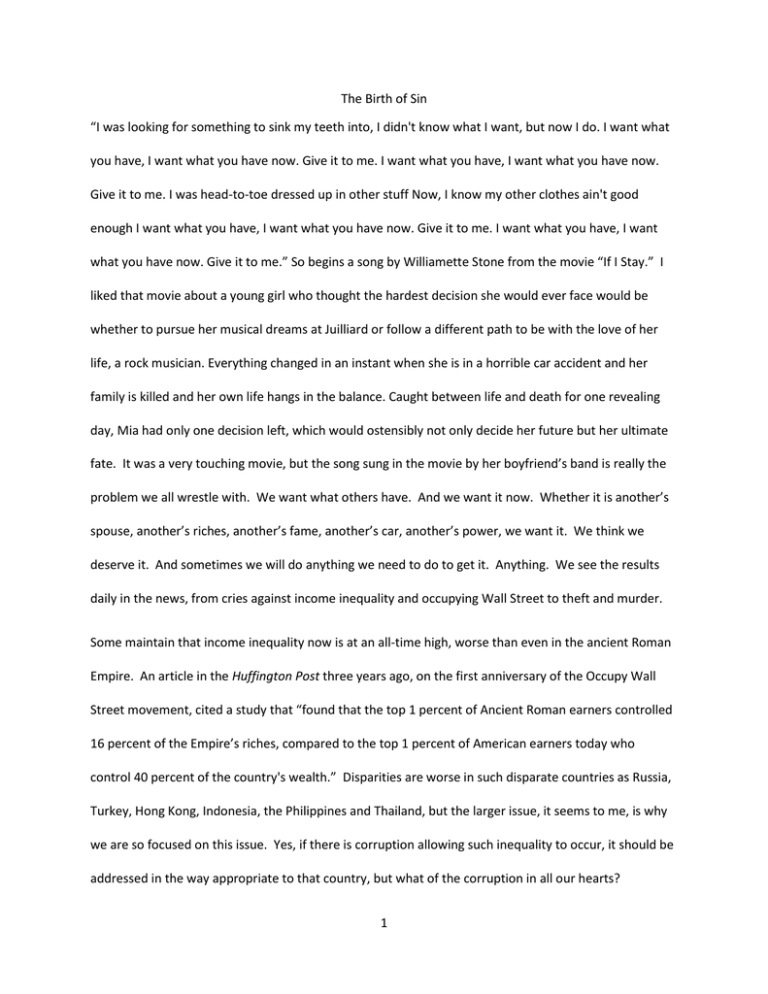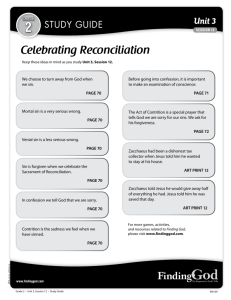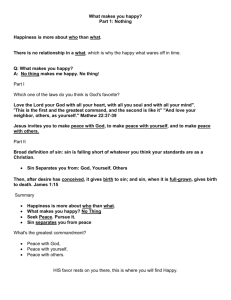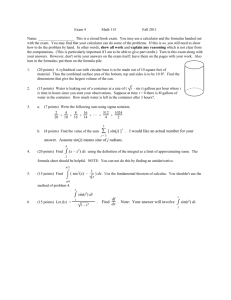The Birth of Sin “I was looking for something to sink my teeth into, I
advertisement

The Birth of Sin “I was looking for something to sink my teeth into, I didn't know what I want, but now I do. I want what you have, I want what you have now. Give it to me. I want what you have, I want what you have now. Give it to me. I was head-to-toe dressed up in other stuff Now, I know my other clothes ain't good enough I want what you have, I want what you have now. Give it to me. I want what you have, I want what you have now. Give it to me.” So begins a song by Williamette Stone from the movie “If I Stay.” I liked that movie about a young girl who thought the hardest decision she would ever face would be whether to pursue her musical dreams at Juilliard or follow a different path to be with the love of her life, a rock musician. Everything changed in an instant when she is in a horrible car accident and her family is killed and her own life hangs in the balance. Caught between life and death for one revealing day, Mia had only one decision left, which would ostensibly not only decide her future but her ultimate fate. It was a very touching movie, but the song sung in the movie by her boyfriend’s band is really the problem we all wrestle with. We want what others have. And we want it now. Whether it is another’s spouse, another’s riches, another’s fame, another’s car, another’s power, we want it. We think we deserve it. And sometimes we will do anything we need to do to get it. Anything. We see the results daily in the news, from cries against income inequality and occupying Wall Street to theft and murder. Some maintain that income inequality now is at an all-time high, worse than even in the ancient Roman Empire. An article in the Huffington Post three years ago, on the first anniversary of the Occupy Wall Street movement, cited a study that “found that the top 1 percent of Ancient Roman earners controlled 16 percent of the Empire’s riches, compared to the top 1 percent of American earners today who control 40 percent of the country's wealth.” Disparities are worse in such disparate countries as Russia, Turkey, Hong Kong, Indonesia, the Philippines and Thailand, but the larger issue, it seems to me, is why we are so focused on this issue. Yes, if there is corruption allowing such inequality to occur, it should be addressed in the way appropriate to that country, but what of the corruption in all our hearts? 1 Wealthy landowners in the Roman Empire exploited the poor, eventuating in war against Rome and the slaughter of Jewish aristocrats by those less well off. James, in keeping with longstanding Jewish wisdom, stresses that riches fade, that God will vindicate the poor and oppressed in the end, and that he will judge those who care only for themselves and not for the less fortunate. Far from calling for some kind of movement or uprising, James says the believer in Jesus Christ “who is lowly” should “boast in being raised up,” while “the rich [are] being brought low” and soon to disappear “like a flower in a field.” “All flesh is like grass and all its glory like the flower of grass. The grass withers, and the flower falls, but the word of the Lord endures forever” (Isa. 40:6-8). None of us can stand when the Son of Righteousness arises to judge us, but it is particularly the rich who are expected to “wither away.” Why is that? It is because when people have their needs and many of their wants covered, they tend to forget about God or think they don’t even need him, maybe that he doesn’t even exist. We see it all around us today in America, which is increasingly turning away from God. We are a rich nation and even the poorest in this country live better than 70% of the people around the world. But we don’t hear about that. What we hear instead is that we should have what the 1% has and they should give it to us. And if they did, would we be happier or more content? Is not the problem our own covetous hearts? We need to embrace the truth that happiness is not found in the amount of goodies we have. Happiness, peace, contentment, are found in resting in divine providence. God gives us all more than we deserve. He gives us whatever we have out of love and for our good, so that we will acknowledge him, turn from sin and commit to him in new obedience. God never gives us something to make us fall; that is the motivation of Satan. Hence, when James says that the person who endures temptation is blessed, he is speaking of the temptation to go astray, to deviate from God’s will. The one who does not fall into sin through what he encounters along the path of life is the one who is blessed, happy, joyous. Joy and peace come to us through obedience to God, walking with him, not through any amount of power, privilege or goods we can buy, borrow, or steal. It comes through resting in divine grace. 2 God brings trials and difficulties into our lives to test the strength of our faith. It is not that he doesn’t know its strength; rather, he is helping us better to assess it, so that we can shore up our deficiencies. He is helping us thereby to know how much we can lift, to return to our analogy of faith as a muscle and weightlifting that we mentioned a couple weeks ago. God’s intent behind allowing us to undergo difficulty is to strengthen us, not to weaken us. The one who stands fast for him through the test of his faith will receive the crown of life that the Lord has promised to those who love him. Life is a race. It’s not a sprint, but a marathon. We need to endure to the end, to stay the course with God. In the words of Heb. 12:1-2, “Let us also lay aside every weight and the sin that clings so closely, and let us run with perseverance the race set before us, looking to Jesus.” Keep your eyes on the prize! The prize is Jesus. He is not something to be won and salvation is not based on what we do, it is the gift of God, not of works, lest anyone should boast. We must, however, keep our eyes on the one who has gone before us and the one whom we would be like so we persevere in the grace of God and faith in our Lord Jesus. Laying aside weights in any race just makes sense. Indeed, the men who competed in the ancient Olympics (only men did then!) were buck naked. This was the case for races, as well as wrestling and boxing where, it should be noted, a person only won by knocking the other out cold. They had another event similar to wrestling called a pankration, for which there were only two rules: no eye gouging and no biting (the referees carried sticks to beat those who violated the rules). Everything else, including choke holds, breaking fingers and necks, was legit. There was no weight division or time limits: the fight continued until a combatant surrendered, lost consciousness, or died! We’re such wimps today! I’m glad we have more rules for our competitions today! Our games are safer and cleaner as a result. The same is true of the rules God gives us! By complying with God’s law, we are safer and cleaner! It just makes sense! What doesn’t make sense is to claim that God is a cosmic killjoy or that he has evil intent in what he brings to our lives. “God cannot be tempted by evil and he himself tempts no one.” 3 God is altogether good; indeed, Jesus says, “no one is good but God alone” (Mark 10:18). He is of purer eyes than to behold sin and cannot look on iniquity. He does not tempt us to evil. Our own hearts do. The comedian Flip Wilson used to get a lot of laughs by insisting “the devil made me do it.” The devil doesn’t make any of us sin. He can’t. We can yield to his machinations, his evil schemings. But we’re also pretty good at coming up with those apart from him! It begins with what we desire. We are lured by it. The Greek word used here is taken from hunting and fishing: as game is lured from a place of safety to be caught, so we in our lust are lured from the safety of self-restraint to sin. We lay a trap for ourselves! “The iniquities of the wicked ensnare them, and they are caught in the toils of their sin. They die for lack of discipline, and because of their great folly they are lost” (Prov. 5:22-23). Discipline, of course, is the basis of the word for disciple. It has to do with being a student and undertaking a regimen of study. If you’re not studying Christ, you’re bound to be lured away and ensnared. Desire in and of itself is not sin, but it can be the root of it. Wanting what belongs to another goes all the way back to our first parents, who got caught in the snare of wanting to be “like God” in knowing good and evil, so they took of the forbidden fruit and brought humankind to spiritual ruin. It is when desire conceives, when it seizes us, when we have given it place in our hearts, it gives birth to sin. The sin is in the longing for what we should not have, with what does not belong to us, with what is not of God. “Sin is lawlessness” (1 John 3:4). It is making ourselves a law unto ourselves, assuming rights to determine what is right and wrong that belong to God. All sin is capital crime; the wages of sin is death. We all deserve death, for we have all sinned and fallen short of the glory of God. God, however, is amazingly gracious and gives us not just all the good we have, but the greatest good of all, the gift of his Son Jesus Christ for us and our salvation. By his word of truth, by the Word of God incarnate and written, we are given new birth by the working of his Spirit so that we might be new creatures, overcoming sin and death by the power of the risen life given us from Christ. Let us live thus for him! 4





